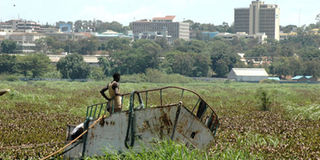Lake faces ecological disaster, warn experts

PHOTO | JACOB OWITI | FILE Water hyacinth in Lake Victoria.
What you need to know:
- Scientists ask State to remove dry water hyacinth from Lake Victoria to save fish, and other organisms
Lake Victoria faces an ecological disaster if dry hyacinth weed is left to sink and rot in the lake, researchers have warned.
Kenya Medical Fisheries Research Institute (Kmfri) experts yesterday said if the weed sunk, aquatic life would be at risk.
“Several species of fish in the lake, especially the much cherished Nile perch, tilapia and small fish (omena) that cannot survive in water with low oxygen concentration might be completely wiped out,” said Kmfri lead scientist Ojwang Oweke.
Mud fish, locally known as kamongo and catfish, locally called mumi, are among the species that can survive in water with low oxygen concentration.
According to the researchers, water hyacinth produces humic acid when it decomposes in water— a process that uses oxygen and deprives aquatic plants and animals of fresh air.
The acid contains harmful elements like iron and manganese, which the scientists attributed to the brown colour of water supplied in the region by Kisumu Water and Sewerage Company Ltd.
Dr Oweke called on the government to make use of colleges and universities in the region to assist in removing the dry weed by use of conveyer belts.
“This is the time for the government to come in and use conveyer belt mechanism to remove the dry hyacinth so as to save the lake,” said Dr Oweke.
“The manual removal used by Lake Victoria Environmental Management Project in 2011 and late last year was a total waste of money and time because this posed a high risk to the labourers and it also led to over-sprouting of the weed.”
He said the machines would clear the dry water hyacinth and dump it on the shores, where it would be burned.
Mr Reuben Omondi, a senior scientist at Kmfri, said the hyacinth had turned brown because weevils had fed on it and it was drying up.
The insects were introduced in the lake by Kenya Agricultural Research Institute in 2005.
“Weevils are killing the weed and the government needs to respond quickly to remove the drying hyacinth lest a looming danger destroys the ecosystem,” he said.




